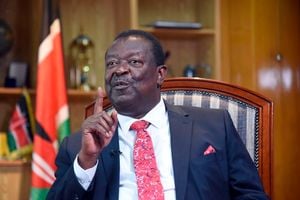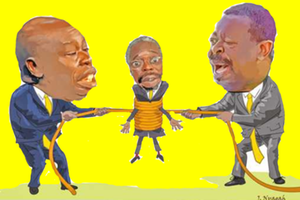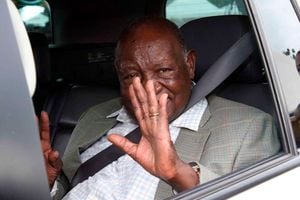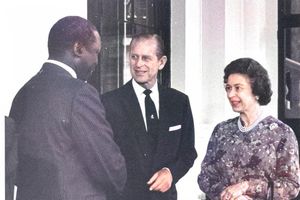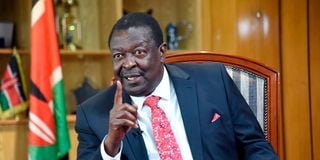
Kenya's Prime Cabinet Secretary Musalia Mudavadi.
In the early 1990s Wycliffe Musalia Mudavadi was the blue-eyed boy of the West who had heightened their criticism of President Daniel Moi’s government, demanding political and economic reforms.
According to declassified documents in London, Mudavadi—now Prime Cabinet Secretary and Foreign Affairs Cabinet Secretary— then serving as finance minister in Moi’s government was viewed as new blood and a reformer in a government tainted with accusations of corruption and human rights abuses.
The then Finance minister’s moderate political outlook and and aversion to controversy further endeared him to the West.
“Mudavadi has retained his integrity and regularly stood up to the President persuading Moi to take some very difficult decisions. He needs help and encouragement of the donors,” read one document dated September 1993 and marked ‘restricted’, while another dated September 1993 stated, “Mudavadi was likely to be a much more worthwhile Kenya interlocutor than Mr Kalonzo Musyoka (the Minister for Foreign Affairs).”
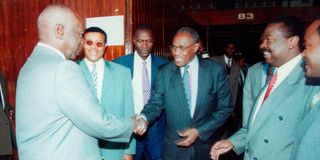
In this undated photo, former President Daniel Moi (left) greets former Vice President George Saitoti as Musalia Mudavadi and Kalonzo Musyoka look on.
The documents further reveal how during a private meeting with Baroness Lynda Chalker, the British Minister for Overseas Development and Africa, Mudavadi revealed that corruption was taking place on a huge scale in Moi’s government but he was not sure whether forces within the government would allow him to tackle it.
Mudavadi was only four years into his political career, having been elected unopposed to succeed his deceased father Moses Mudamba Mudavadi as MP for Sabatia in 1989.
He was immediately appointed minister for Supplies and Marketing, a position he held until January 1993 when he was moved to the Treasury as the minister for Finance to succeed Prof George Saitoti who had been dropped from the docket at the insistence of donors .
An alumnus of University of Nairobi and a one time employee of Tysons Estate Agents Ltd, his meteoric rise to the Cabinet was as a result of the political influence his father had wielded in Western Kenya before his death, and the support he had given Moi in consolidating his rule.
Also Read: Use-and-dump culture has stunted democracy
Mudavadi’s appointment as Finance minister came against the backdrop of runaway corruption and financial misconduct involving President Moi’s cronies, which had played a great role in the suspension of aid by donors.
In 1991, donors had insisted that a range of political and economic reform measures were needed before new balance of payment support could be given to Kenya. Even though the government made significant political reforms by allowing multiparty politics, Bretton Woods institutions and bilateral donors felt that the economic agenda had been tackled less vigorously.
Consequently they prescribed new measures which were immediately rejected by President Moi on March 22, 1993.
Kenya eventually returned to the negotiations with the IMF and World Bank, partly because of Mudavadi’s influence and the intervention of British prime minister Sir John Major, who according to declassified papers, personally wrote to Moi pleading with him to resume negotiations, promising that Britain would consider new balance of payments for Kenya as soon as the IMF and World Bank were satisfied Kenya’s economic policies were back on track.
Among the strategies Mudavadi put in place to meet the targets set by the World Bank and the IMF following the negotiations were the tightening of the monetary policy to reduce the liquidity of the economy, and the introduction of measures to ensure the prudent management of the financial sector. These were closely monitored by the World Bank and the IMF.
Among the key changes that took place at the Treasury when Mudavadi took over were the appointment of Micah Cheserem as the Governor of Central Bank and actions on “political” banks such as Transnational Bank.
Cheserem, who moved ruthlessly to restore stability in the financial sector, was replacing Erick Kotut whose tenure was riddled with financial scandals and the collapse of many banks. In one instance, according to the declassified papers, Mr Bird, the Chief Executive Officer of Barclays Bank, complained in strict confidence to one diplomat about Kotut’s dealings at the Central Bank.
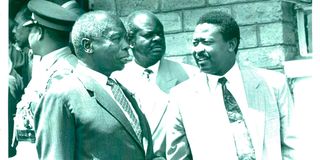
In this undated photo, former President Daniel Moi has a word with then Finance Minister Musalia Mudavadi. In the background is former Assistant Minister Andrew Ligale.
“The Chief Executive Officer Barclays Bank came to see me yesterday afternoon, Mr Bird was scathing about Kotut and his methods,” read a document signed by Mr W.K Prendergast, the British High Commissioner to Kenya.
According to Bird, reports in the press that Pan-African Bank had been bought by Middle Eastern interests were totally false. “What happened was that payment had been made to Barclays in Kenya shillings from one of the Central Bank’s own accounts which was highly irregular.”
The same document revealed how the then minister for Agriculture Simeon Nyachae complained about Kotut’s failure to take action after he gave him a dossier showing that Central Bank had authorised payment for the exportation of hides worth Sh106 million yet Kenya Meat Commission was not in operation.
Mudavadi’s first important meeting as Finance minister was the informal consultative meeting convened by donors in May 1993 in Paris to discuss progress made by Kenya towards targets set before the resumption of aid. He first flew to London where he met Baroness Lynder Chalker, the British Minister for Overseas Development and Africa.
This was informed by the feeling that Britain, being the donor country with strong relations with Kenya, could influence the outcome of the Paris meeting.
“Mudavadi will be looking for our encouragement and support, and for us to give a lead in Paris to the other donors by sounding a positive note,” wrote Sir Prendergast while encouraging British senior officials to meet Mudavadi. “This will be Mudavadi’s only stop-off before the consultative group meeting. I recommend that both you and Lady Chalker see him if at all possible.”
A follow up correspondence marked ‘restricted’ noted: “Mudavadi is one of the leading reformists in the Kenya . We should reinforce him by welcoming the Kenya agreement with IMF as a very positive step, stressing that implementation is now the key, making clear that we have continuing political concerns (ethnic clashes, freedom of the press etc), signalling our willingness to pledge new programme aid money later in the year if the current economic trends continue.”
Mudavadi met Chalker on May 24, 1993. Accompanying him were Minister for Commerce and Industry Joseph Kirugi M’Mukindia, Minister for Information and Broadcasting Johnstone Makau and the permanent secretary in the ministry of Finance Wilfred Koinange.
During the meeting, Chalker welcomed the progress made to meet donor targets, insisted on the need for dialogue between the government and the opposition, and pressed hard on corruption in the government and the improvement of press freedom.
According to the record of the meeting, Chalker was particularly concerned and very firm about the issue of corruption which, she said, was worrying donors. She insisted that corruption had to be tackled, revealing that she had already put Moi to task over the vice and would continue doing so at the highest level.
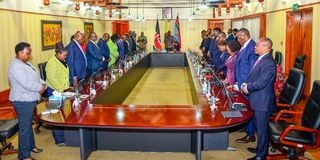
President William Ruto with his Cabinet Secretaries during a Cabinet meeting at Sagana State Lodge, Nyeri County.
Mudavadi responded by saying that Kenyans too were determined to root out corruption , by removing remnants of past poor practices such as import licence which had been a major source of abuse.
With other Kenyan government officials present, Mudavadi was very measured in his conversation with the British minister. But later in a private session not attended by the other officials, he confessed to Chalker that there was evidence of major corruption in the government, however he “has was not too sure whether he would be allowed to investigate”.
Chalker told him to be free to share secretly any details on corruption with the British High Commissioner in Nairobi.
“Mudavadi welcomed this suggestion and you can expect him to make contact,” read a correspondence sent to the High Commissioner after the meeting.
Mudavadi would again return to London in October 1993 to address the private meeting of East Africa Association, an organisation of British based companies with business interests in Kenya, Uganda, Tanzania, Mauritius, Seychelles and Madagascar.
But the British High Commissioner also wanted him to capitalise on his trip to London to meet senior British officals since it was just a month to a critical consultative meeting during which donors were to make a decision on Kenya.
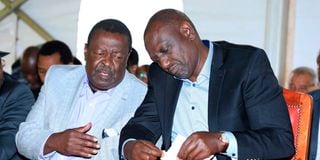
Prime Cabinet Secretary Musalia Mudavadi (left) and President William Ruto during a meeting with Kenya Kwanza leaders in Karen on August 17, 2022.
“When I saw Mudavadi on 15 September, I asked whether he would like some appointments in London. Mudavadi said he would, but that he would not be able to undertake a full category II sponsored visit on this occasion because of his requirement to return to Nairobi before leaving for Tokyo,” the diplomat wrote.
The High Commissioner further advised London, “Since his appointment, Mudavadi has done an excellent job in difficult circumstances. He has retained his integrity and regularly stood up to the President, persuading Moi to take some very difficult decisions against his instincts. He needs help and encouragement of the donors. I should recommend that he should be received at high level in London on 1 and /or 4 October.”
Mudavadi transited London on October 1, 1993 en route to Nairobi after attending the Commonwealth Finance Minister’s meeting in Nassau and discussions with the IMF in the United States. While in London he held discussion with Mark Lennox Boyd, Under Secretary for Foreign and Commonwealth Office, where talks on economic reforms featured prominently. He was accompanied by Micah Cheserem, the Governor of Central Bank of Kenya, Dr Wilfred Koinange, Permanent Secretary for Finance, and Mr J. Ruto, Kenya’s High Commissioner to London.
The delegation also called on the Chief Secretary to Her Majesty’s Treasury and the Deputy Governor of the Bank of England.
“The quietly-spoken Mudavadi impresses as calm and able. The seriousness of his aim may be gauged from the fact that he stepped off an aircraft from Washington straight into meetings,” read a report compiled by the Foreign and Commonwealth Office following the meeting. “On returning to his hotel, the courteous Mr Mudavadi whispered conspiringly to the accompanying officer, “put in a good word for me at the Foreign Office” .
In pushing for reforms, the British were also well aware of the impact of the collapse of Kenya’s economy on their own interests.
As the High Commissioner noted, “We need to be conscious of our interest in the round here, 50,000 British citizens would presumably seek to come to the UK if the Kenya economy was to collapse.” And, “the deputy Chairman of Barclays bank told me yesterday that Kenya was his most important operation after UK.” Therefore, they had to support Finance Musalia Mudavadi to succeed by all means.
- The writer is a London-based Kenyan researcher and journalist

